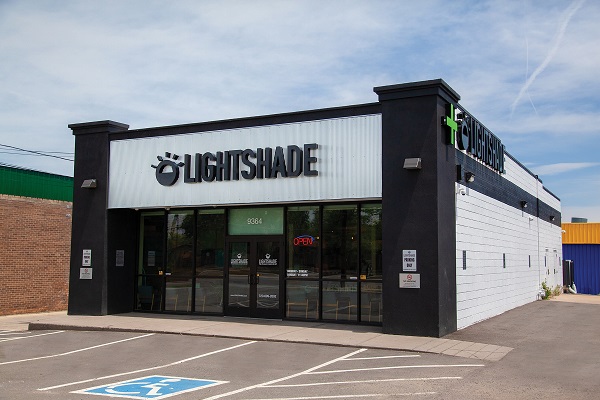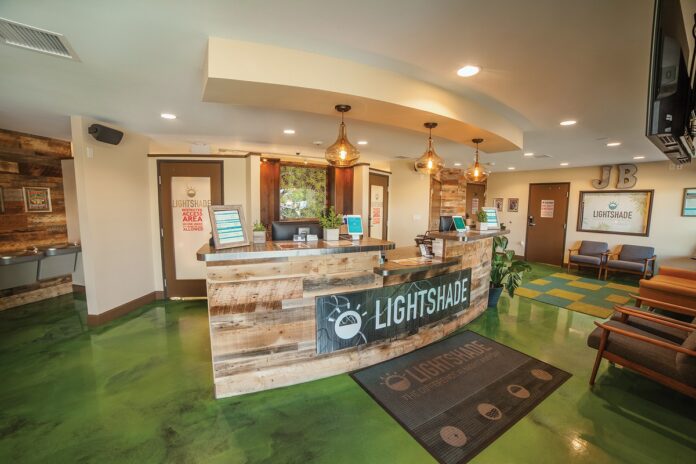Lightshade is coming up on its tenth year serving Colorado. The milestone anniversary will see the independent chain’s expansion to nine locations in Denver and Aurora, including the first drive-through facility on the Front Range.
“We are the last standing large independent chain in Colorado,” said Lisa Gee, director of marketing and corporate social responsibility. “We’re not as big as some of our competitors, not by a long shot, but we’re still independently owned and that means a lot to us.”
Gee believes independent ownership is key to the company’s prolonged success and individuality. All decision-making remains local, and each dispensary maintains laser focus on identifying and meeting the needs of its customers.
Prior to founding Lightshade in 2011, Steve Brooks and John Fritzel were high-end home developers. Confronted with a crumbling housing market in 2008–2009, they pooled their collective experience and bet big and early on a theory many in the cannabis industry have begun to realize only recently: Elevating design can reduce stigma and thus reach a much wider audience.
“Our first store had a very different look and feel from most of the stores in the Denver metropolitan area,” Gee said. “That was very much intentional. We wanted to stand out, and we strived to bring out those new customers that didn’t have a retail experience that spoke to them.
“Don’t get me wrong,” she quickly added. “We get as many hardcore cannabis aficionados as anyone else. But we really set out to reach different demographics of people who we see having a lot of growth potential.”
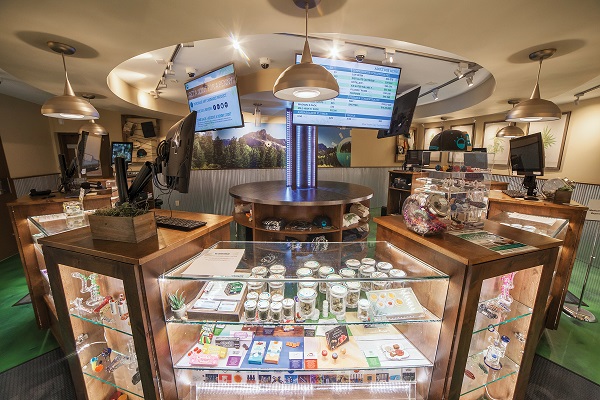
One such demographic is the elderly. The Dayton Street location in Denver is just blocks away from the Windsor Gardens retirement community, the residents of which Gee said account for as much as 60 percent of the store’s customers. “This community is very much in need of alternatives to pharmaceuticals, and we take the responsibility of those needs very seriously,” she said.
In order to attract specific, often hard-to-reach consumer groups, the design team leaned into creating a bright, inviting interior and communicating in clear, compassionate language.
“The philosophy has always been to put people at ease from the moment they walk in,” explained Gee. “The design of our space is essential to this, and we have really explored using design to help reduce stigma surrounding cannabis.”
Today, intentional, elegant design frequently is used as an effective tool to reassure skittish new users cannabis can be for them, too, but that was a novel philosophy when Lightshade debuted its first shop.
“Two thousand eleven was a very different era in cannabis,” said Gee. “Cannabis culture had a particular look and style, and from the beginning we really wanted to get away from the Jimi Hendrix posters, the tie-dye, all that stuff. There are a lot of people out there that just doesn’t resonate with.”
All of the retail locations follow an almost alpine industrial aesthetic. Replete with natural materials—reclaimed barnwood panels, lush houseplants—and accented with hip light fixtures, steel signage, and striking buffed concrete floors, the lobby areas are inviting, bright, and charming.
On the shop floor, the chain’s signature horseshoe-shaped counters incorporate seven identical stations, allowing for high-volume service without hurrying the customers. “We want you to feel like you are in a high-end restaurant or a high-end retailer where the customer very much comes first,” Gee said.
Gee pointed out the shops’ effect-based nomenclature and product categorization as an example of the company’s devotion to customer-centric marketing. On posters adorning the walls in the lobby and steering the patient-budtender dialogue that fills the air on the shop floor, the words Enliven, Inspire, Calm, and Rest guide consumers toward the products they need.
“We have a very consultative relationship with the budtender and the customer, which is more rare in Colorado,” explained Gee. “We were interested in taking the conversation away from just the strains and toward talking about terpene profiles. This allows us to dial in the conversation in a slightly more educated way.”
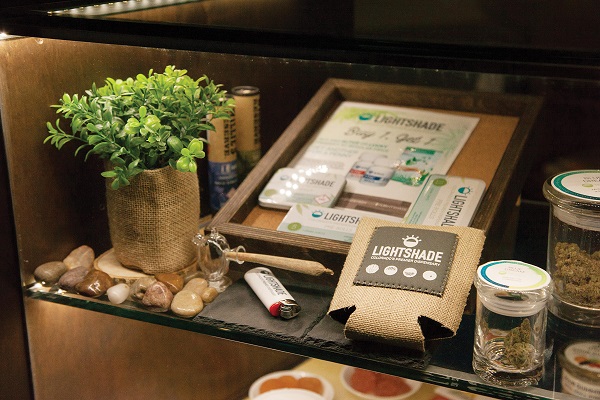
Another example of commitment to making responsible recommendations is embodied by Lightshade’s relationship with Leaf411, a toll-free 1-800 line that connects consumers with trained cannabis nurses. The nurses can make detailed assessments of a person’s needs and provide them with personalized product recommendations. Gee said older patients often visit with specific health-related questions, many of which budtenders shouldn’t be expected to answer confidently. When this occurs, staff members recommend the customer call Leaf411 and speak to a medical professional.
“Lightshade is a fantastic example of what dedicated excellence in customer care looks like,” said Katherine Golden, Leaf411’s chief executive officer and executive director. “The Lightshade staff are experts in knowing the fine details of all the products they carry and can easily educate the consumer on ingredients, potency, ratios, etc. But if the staff is asked a question about a medical condition, sign, or symptom, they immediately refer those questions to the Leaf411 hotline versus walking the dangerous line of giving medical advice from non-licensed medical professionals.”
Gee explained the nurses often walk customers through their current pharmaceutical list and zero in on what kind of effect they seek. Then, they recommend products the patient can try in the ratios that may work best. Essentially, the nurses “prescribe” cannabis responsibly.
“The customers can then confidently walk back into our store with a list of products and make purchases based on real advice from people who are specifically trained to do that,” Gee said.
In addition to her role as director of marketing, Gee also leads the company’s extensive corporate social responsibility program. Recently, the dispensary chain began working with Athletes for CARE, a nonprofit founded by former professional athletes to advocate for the health, wellbeing, and safety of those who play sanctioned sports the world over. Given how rapidly cannabis has emerged as a panacea for a variety of different sports-related injuries and ailments, cannabis research and advocacy have become important tenets of the organization.
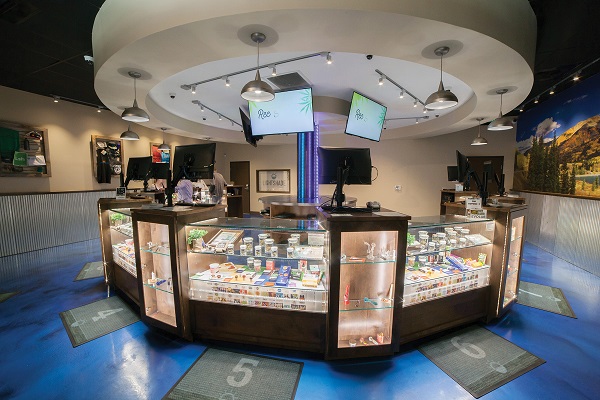
However, the biggest focus of late has been adapting rapidly to the new normal of the COVID-19 era. The chain implemented rigorous and regular cleaning protocols, mask requirements, sneeze guards, UV lighting, and additional air filtration systems in a bid to make their dispensary environments as safe as possible.
But amid the upheaval, the changes led to some indirect benefits. While Colorado prohibits event sponsorship for cannabis companies, the dramatic pivot to digital events created an opening they fully embraced. The company kicked off a series of monthly 420 parties on Twitch featuring DJs including Public Enemy’s DJ LORD and DJ K-Nee, local comedians, cannabis cooking, and vibrant chat rooms. The events direct proceeds and donations to charities fighting homelessness and hunger, benefitting frontline workers and, most recently, supporting Black Lives Matter.
Gee believes Lightshade’s perpetual focus on doing what’s right for customers and the surrounding community has been a key differentiator for the chain. And as the company reaches the decade milestone, she credits a strong moral conviction and staunchly independent spirit with much of the dispensaries’ success.
“We’ve carved out a reputation for doing things the right way, and that is recognized in Colorado,” she said. “People keep coming back here because of that.”
